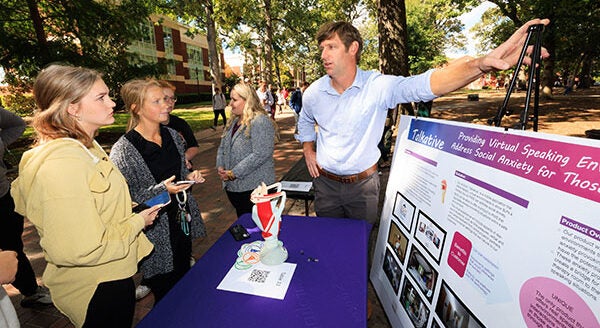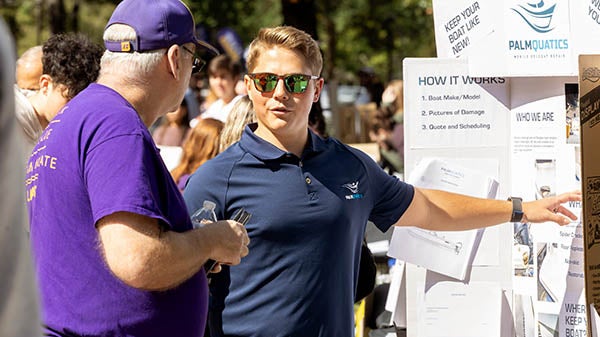ECU student teams launch startup ideas for entrepreneurship challenge
More than 70 teams participated in the first round of the seventh annual Pirate Entrepreneurship Challenge, competing for $170,000 in cash and in-kind prizes in the East Carolina University College of Business’ signature pitch competition.

Patrick Briley discusses his product, called Talkative, that helps people with speech disorders. (Photos by Rhett Butler)
Startup business ideas included waders with built-in flotation to prevent drowning for hunters and fishermen, a virtual reality rehabilitation app for injured athletes, an entertainment business designed to increase kids’ confidence by interacting with their favorite costume characters, and a multifunction home health care device and app for caregivers.
Round 1 launched Tuesday with an open-air expo on the ECU Mall. Visitors stopped by the tables to learn about each business idea and vote for their favorites. In addition to the popular vote, secret expert judges reviewed the proposed businesses and leaders from the Miller School of Entrepreneurship weighed in to determine the 12 teams that advanced to the second round, which will be held Feb. 6 in the Health Sciences Student Center.
The competitors included undergraduate, graduate and doctoral students representing 41 different majors in eight colleges, and more than 1,700 votes were cast during the opening round, said David Mayo, teaching instructor in the Miller School of Entrepreneurship and the event’s organizer.
The advancing teams include:
- Horizon Shield, a pedestrian safety system for intersection monitoring.
- Dude Trips, a travel agency centered on creating the trip of a lifetime for men and bachelor parties, as well as company retreats.
- Twist-n-Surf, surf wax in a twist up-down stick container (like deodorant) that is heat resistant and environmentally friendly.
- PALMQUATICS, a service-based business that works with boat dealerships and private owners to provide repair services specializing in fiberglass and gel coat repair.
- Crossfit Greenville Kids, a place of strength and empowerment for the area kids.
- Moon Grips, a novel universal pill bottle opener to ease the process of adhering to medication regimens.
- GRID, an all-in-one housing app for college students.
- Arnold and Curtis Education Design, educational kits for teachers to introduce students of all ages to STEM and simplify the teacher’s experience.
- Valet, a ride hailing service where a driver arrives and takes the customer home in the customer’s own car.
- Mental Ease Kit, a service to enhance mental well-being on campuses by providing items that promote mindfulness and provide resources to help students navigate a stressful and anxious time, in the form of a gift box or subscription box.
- Limulus Biomedical, a company that will design, construct and maintain aquaculture systems for the American horseshoe crab with the purpose of sustainable hemolymph collection.
- Talkative, a virtual reality speaking environment to help speech language pathologists assist their stuttering patients with real-world situations.

Gage Palmer pitches PALMQUATICS, a mobile service-based business in the marine industry that provides gel coat and fiberglass repairs to boat owners and dealerships.
“(Speech therapy patients) are able to immerse themselves within whatever environment, whether that’s in the drive-thru, doctor’s office, college lecture hall or ordering at Sup Dogs,” said Amber Faircloth, a doctoral student in rehabilitation sciences and a member of the Talkative team. “They are in a safe environment in the clinic room with their speech therapist, and they are immersed in something where they are able to practice their strategies to hopefully work on desensitizing some of that social anxiety.”
Chip Galusha, acting director of the Miller School of Entrepreneurship, said the first round provides a great opportunity for students to see other students pitching their business ideas.
“We do this one outside on purpose,” Galusha said, “so students can see their friends and see what they’re doing. There’s no idea that’s too new or too crazy. Just come out and pitch it and see what happens.”
Tyler Hodge, an entrepreneurship student and co-founder of Limulus Biomedical, said there is as much as a 30% mortality rate for wild-caught horseshoe crabs, whose blood contains a protein used in the medical industry to test for bacterial contamination in injectable drugs. Through aquaculture, he and his partner, Payton Cottrell, hope to reduce mortality and create a more stable supply of the vital protein.
Winning the competition, Hodge said, would provide seed money needed to expand the idea and make connections in the medical industry.
Following the second round in February, six finalists will be selected to advance to the final round, set for April 10 in the Main Campus Student Center.